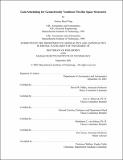Gain scheduling for geometrically nonlinear flexible space structures
Author(s)
Yung, Jeremy Hoyt, 1971-
DownloadFull printable version (2.645Mb)
Other Contributors
Massachusetts Institute of Technology. Dept. of Aeronautics and Astronautics.
Advisor
David W. Miller.
Terms of use
Metadata
Show full item recordAbstract
A gain-scheduling approach for the control of geometrically nonlinear structures is developed. The objective is to improve performance over current linear design techniques that are applied to the same control problem. The approach is applicable to a variety of structures that have complex dynamics with slow variations such as flexible robotic arms and space structures with gimballing solar arrays. The modeling approach is motivated by the lack of in situ test data available for design of 0-g controllers. A Linear Fractional form allows the nonlinear and uncertain aspects of the structure to be modeled independently. The geometric nonlinearity is modeled using a feedback description of structural coupling. The uncertainty model is based on a physical parameter description, so that an experimentally identified 1-g parametric uncertainty model can be extrapolated to 0-g. The control approach is motivated by the success of linear control design synthesis and analysis techniques for space structures. Graphical heuristics for linear control design using Linear Quadratic Gaussian (LQG) and Sensitivity Weighted LQG techniques are introduced. A procedure to realize reduced-order gain-scheduled controllers from a family of linear state-space controllers is developed. A nonlinear analysis framework suitable for the slow variations of geometrically nonlinear structures is also presented. The realization procedure and nonlinear analysis is combined with the graphical linear design heuristics to form an iterative gain scheduled design process. The complete gain scheduling approach is applied to the MIT/MACE-II experiment flown on the International Space Station. Gain scheduled controller designs are shown to provide improved performance and robustness over a Multiple Model linear controllerdesign.
Description
Thesis (Ph. D.)--Massachusetts Institute of Technology, Dept. of Aeronautics and Astronautics, February 2002. Includes bibliographical references (p. 181-185). This electronic version was submitted by the student author. The certified thesis is available in the Institute Archives and Special Collections.
Date issued
2002Department
Massachusetts Institute of Technology. Department of Aeronautics and AstronauticsPublisher
Massachusetts Institute of Technology
Keywords
Aeronautics and Astronautics.